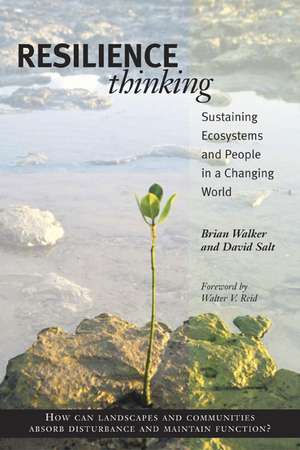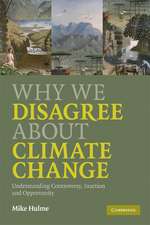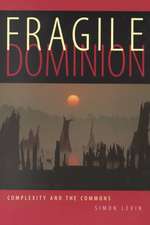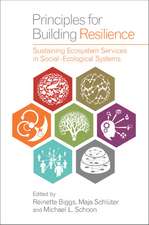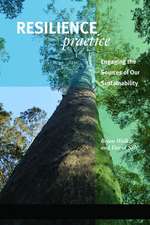Resilience Thinking: Sustaining Ecosystems and People in a Changing World
Autor Brian Walker PhD, David Salt Cuvânt înainte de Walter Reiden Limba Engleză Paperback – 21 aug 2006
Increasingly, cracks are appearing in the capacity of communities, ecosystems, and landscapes to provide the goods and services that sustain our planet's well-being. The response from most quarters has been for "more of the same" that created the situation in the first place: more control, more intensification, and greater efficiency.
"Resilience thinking" offers a different way of understanding the world and a new approach to managing resources. It embraces human and natural systems as complex entities continually adapting through cycles of change, and seeks to understand the qualities of a system that must be maintained or enhanced in order to achieve sustainability. It explains why greater efficiency by itself cannot solve resource problems and offers a constructive alternative that opens up options rather than closing them down.
In Resilience Thinking, scientist Brian Walker and science writer David Salt present an accessible introduction to the emerging paradigm of resilience. The book arose out of appeals from colleagues in science and industry for a plainly written account of what resilience is all about and how a resilience approach differs from current practices. Rather than complicated theory, the book offers a conceptual overview along with five case studies of resilience thinking in the real world. It is an engaging and important work for anyone interested in managing risk in a complex world.
Preț: 206.17 lei
Nou
Puncte Express: 309
Preț estimativ în valută:
39.45€ • 41.29$ • 32.84£
39.45€ • 41.29$ • 32.84£
Carte disponibilă
Livrare economică 10-24 martie
Livrare express 21-27 februarie pentru 21.77 lei
Preluare comenzi: 021 569.72.76
Specificații
ISBN-13: 9781597260930
ISBN-10: 1597260932
Pagini: 192
Ilustrații: figures, photos, maps, boxes
Dimensiuni: 152 x 229 x 13 mm
Greutate: 0.27 kg
Ediția:None
Editura: Island Press
Colecția Island Press
ISBN-10: 1597260932
Pagini: 192
Ilustrații: figures, photos, maps, boxes
Dimensiuni: 152 x 229 x 13 mm
Greutate: 0.27 kg
Ediția:None
Editura: Island Press
Colecția Island Press
Notă biografică
Brian Walker has been one of the leading proponents of resilience theory and practice in the past two decades. He is currently an honorary fellow at Commonwealth Scientific and Industrial Research Organisation (CSIRO), Australian National University visiting professor, and a fellow in the International Beijer Institute for Ecological Economics in Sweden. Walker was chief of Australia's CSIRO Wildlife and Ecology (1985-1999), chaired the Global Change and Terrestrial Ecosystems Project of the International Geosphere-Biosphere Program (1990-1997), and was director of the international Resilience Alliance (2000-2010). He is a fellow of the Australian Academy of Science and of the Australian Academy of Technological Sciences and Engineering and a foreign member of the Royal Swedish Academy of Agriculture and Forestry. He has a long list of scientific publications and has served on the editorial boards of five international journals. With David Salt, Walker coauthored Resilience Thinking (Washington, DC: Island Press, 2006) and Resilience Practice (Washington, DC: Island Press, 2012).
Cuprins
Foreword
Preface
Acknowledgments
Chapter 1. Living in a Complex World: An Introduction to Resilience Thinking
-Case Study 1: Carving up a National Icon: The Florida Everglades
Chapter 2. The System Rules: Creating a Mind Space for Resilience Thinking
-Case Study 2: Between a (Salt) Rock and a Hard Place: The Goulburn-Broken Catchment, Australia
Chapter 3. Crossing the Threshold: Be Careful about the Path You Choose—You May Not Be Able to Return
-Case Study 3: Losing the Jewel in the Crown: The Coral Reefs of the Caribbean
Chapter 4. In the Loop: Phases, Cycles, and Scales—Adaptive Cycles and How Systems Change
-Case Study 4: Scenarios on the Lakes: The Northern Highlands Lake District, Wisconsin
Chapter 5. Making Sense of Resilience: How Do You Apply Resilience Thinking?
-Case Study 5: Building Resilience in the Wetlands: The Kristianstads Vattenrike, Sweden
Chapter 6. Creating Space in a Shrinking World: Resilience and Sustainability
Postscript for a Resilient World
Further Reading
References
Glossary
About the Authors
Index
Preface
Acknowledgments
Chapter 1. Living in a Complex World: An Introduction to Resilience Thinking
-Case Study 1: Carving up a National Icon: The Florida Everglades
Chapter 2. The System Rules: Creating a Mind Space for Resilience Thinking
-Case Study 2: Between a (Salt) Rock and a Hard Place: The Goulburn-Broken Catchment, Australia
Chapter 3. Crossing the Threshold: Be Careful about the Path You Choose—You May Not Be Able to Return
-Case Study 3: Losing the Jewel in the Crown: The Coral Reefs of the Caribbean
Chapter 4. In the Loop: Phases, Cycles, and Scales—Adaptive Cycles and How Systems Change
-Case Study 4: Scenarios on the Lakes: The Northern Highlands Lake District, Wisconsin
Chapter 5. Making Sense of Resilience: How Do You Apply Resilience Thinking?
-Case Study 5: Building Resilience in the Wetlands: The Kristianstads Vattenrike, Sweden
Chapter 6. Creating Space in a Shrinking World: Resilience and Sustainability
Postscript for a Resilient World
Further Reading
References
Glossary
About the Authors
Index
Recenzii
"...a
clear,
readable,
non-academic
explanation
of
the
difference
between
an
optimization
mindset
and
a
resilience
mindset."
"Resilience Thinking is an impressive and highly successful effort to explain complex ecological and social interactions and changes in a unified framework and in language accessible to a wide audience. This book should stimulate extensive discussions on these critical issues and innovative ways to approach them."
"Resilience Thinking provides a much-needed accessible entrée into a concept that holds the key to our future.... Full of wisdom, sophisticated science, and practical guidance, this book provides profound ideas, insights, and hope to scientists, students, managers, and planners alike."
"Resilience Thinking is an essential guidebook to a powerful new way of understanding our world—and of living resiliently within it—developed in recent decades by an international team of ecologists. With five clear and compelling case studies drawn from regions as diverse as Florida, Sweden, and Australia, this book shows how all highly adaptive systems—from ecologies to economies—go through regular cycles of growth, reorganization, and renewal and how our failures to understand the basic principles of resilience have often led to disaster. Resilience Thinking gives us the conceptual tools to help us cope with the bewildering surprises and challenges of our new century."
Descriere
Offers a different way of understanding the world and a fresh approach to managing resources. This work embraces human and natural systems as complex entities continually adapting through cycles of change and seeks to understand the qualities of a system that must be maintained or enhanced in order to achieve sustainability.
